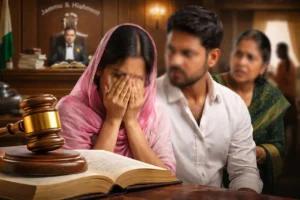In a significant legal development, the Allahabad High Court has clarified that marriages conducted in Arya Samaj Temples between two Hindus (a male and a female), performed in accordance with Vedic or other customary Hindu rites, are valid under Section 7 of the Hindu Marriage Act, 1955. The Court emphasised that the location of the marriage—whether in a temple, house, or open space—is irrelevant, as long as the customary Hindu rituals are properly followed.
The ruling came in response to a petition filed under Section 482 CrPC by one Maharaj Singh, who sought to quash a case lodged by his wife under Section 498A IPC. He argued that his marriage, allegedly conducted at an Arya Samaj temple, was not valid and that the Arya Samaj marriage certificate submitted by his wife was forged.
Read also: Allahabad High Court: No Automatic Stay On Arbitral Award Merely Upon Filing Appeal Under Section 34
“Marriage in Arya Samaj Mandir, If Performed with Proper Rites, Is Valid”
Justice Arun Kumar Singh Deshwal, delivering the judgment, stated:
"In Arya Samaj Mandir, marriage is conducted as per the Vedic procedure, which includes Hindu customs and rites like Kanyadan, Panigrahan, Saptapadi and chanting of Mantras while applying vermilion. Therefore, this court has no hesitation to hold that any marriage solemnised in Arya Samaj Mandir as per the Vedic procedure is valid as it fulfills the requirements of Section 7 of the Hindu Marriage Act.”
Read also: Runaway Marriages Don't Guarantee Police Protection Without Real Threat: Allahabad High Court
While the Court acknowledged that the Arya Samaj-issued certificate itself does not carry statutory evidentiary force, it clarified that such a certificate is not waste paper and can be substantiated during trial through the testimony of the Purohit (priest) under the Bharatiya Sakshya Adhiniyam, 2023.
Quoting Section 7 of the Hindu Marriage Act, the Court reiterated:
"A Hindu marriage may be solemnised in accordance with the customary rites and ceremonies of either party thereto. Where such rites and ceremonies include Saptapadi, the marriage becomes complete and binding when the seventh step is taken.”
This clearly indicates that performance of Hindu rituals—irrespective of venue—is essential, and not the registration or specific location.
Maharaj Singh had relied on a previous Division Bench judgment in Ashish Morya v. Anamika Dhiman, where it was observed that Arya Samaj certificates do not hold statutory validity. However, the Allahabad High Court clarified that this does not render the marriage invalid, if it was solemnised following proper Hindu rites.
The Court noted:
“The judgment in Ashish Morya only highlights the lack of statutory force of Arya Samaj certificates. It does not declare that a marriage conducted at Arya Samaj Mandir with proper Hindu customs is invalid. In fact, the said judgment found no evidence of Saptapadi, which is why the marriage was declared void.”
The Court examined the Uttar Pradesh Hindu Marriage Registration Rules, 1973 and the Marriage Registration Rules, 2017, noting that registration is not a requirement for a valid marriage, although it has evidentiary value.
Quoting from Seema v. Ashwini Kumar [(2006) 2 SCC 578], the Court explained:
“Registration of marriage is not a prerequisite for a valid marriage but has great evidentiary value… It facilitates proof of marriage and protects the rights of women and children.”
The judgment delved into the cultural and historical roots of Vedic marriage, recognising it as the most traditional form of Hindu marriage, involving rituals like Kanyadan, Panigrahan, and Saptapadi, often conducted in Sanskrit.
It also acknowledged Arya Samaj’s reformist vision:
“Arya Samaj is a mission founded by Swami Dayanand Saraswati in 1875. It is a monotheistic Hindu reform movement which opposes caste-based discrimination and promotes Vedic knowledge.”
On the charge under Section 498A IPC, the Court considered the woman’s statement under Section 161 CrPC, which detailed allegations of cruelty. The applicant argued that since there was no valid marriage, Section 498A should not apply.
However, referring to Aluri Venkata Ramana v. Aluri Thirupathi Rao (SLP (Crl) No. 9243/2024), the Court noted:
“To attract liability under Section 498A IPC, demand for dowry is not necessary. Subjecting the wife to cruelty is sufficient.”
Hence, it rejected the argument and observed that the question of marriage validity raised by the applicant was a disputed fact, not suitable for consideration at the stage of quashing under Section 482 CrPC or 528 BNSS.
Case title - Maharaj Singh vs. State of U.P. and Another 2025















